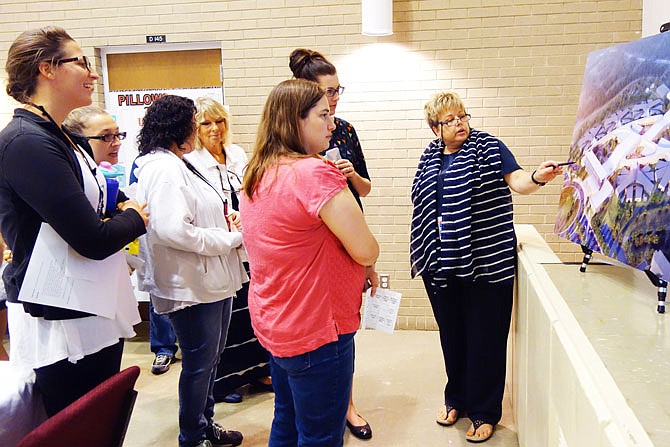Fulton State Hospital employees were able to ask vital questions Tuesday about the in-progress Nixon Forensic Center.
The sprawling new facility will house current residents of the Biggs and Guhleman buildings after its completion in late 2018. Rather than simply being new digs for FSH clients, the facility will impact everything from employee pay to discharge protocols. During Tuesday's strategic planning open house, staff learned many details about Nixon Forensic Center.
"It's very exciting," FSH CEO and COO Andy Atkinson said. "The different groups, activities and general milieu will be more conducive to treatment (for clients) and improving staff safety."
Nixon Forensic Center will feature 300 beds split into 12 wards, according to Rehabilitation Services Director Jamie Smith. Each ward will have its own outdoor courtyard and day rooms. There will also be a pair of enclosed outdoor areas, a fitness center for staff, a canteen with separate areas for clients who need more or less supervision, among other amenities.
Numerous updates will focus on safety for clients and staff.
"When Biggs was built, it wasn't designed for treatment," director of security Russel De Trempe said. "It was designed for containment."
That means while clients can be locked securely in their rooms in Biggs, the facility isn't designed to allow them to move around safely. Blind spots in the halls posed dangers for employees in the older facilities. That's been corrected in Nixon.
"From the nursing station (in the center of each ward) you can see everywhere and open doors," Smith said.
The halls are shorter and have fewer bends. Other security measures include bolted-down furniture, certain corridors being accessible only by staff and an emergency button on staff key fobs.
"More security measures are going to be in place on this," De Trempe said.
Planning for Nixon didn't just stop at drawing up a blueprint and hiring contractors. Teams of FSH staff have been working on everything from HR issues to preparing the clients for the transfer.
Atkinson pointed out while Biggs was a maximum-security facility and Guhleman was intermediate-security, Nixon will be somewhere between the two. He called it "high-security."
This change has implications for several major areas of FSH operation, such as pay.
Currently, security staff in Biggs are paid more than those in Guhleman, as the maximum-security facility is more dangerous than other buildings. Atkinson said Guhleman guards transferred to the Nixon facility will also receive the extra pay.
Atkinson said discharge procedures will also need reevaluation
"Currently, we basically only admit to Biggs," he explained. "Guhleman is a step down in security."
Typically, clients start at Biggs and earn the privilege of moving to Guhleman. When they're ready, they're transferred to one of the five minimum security facilities in the state, he said.
"Now they won't have a ward to move down to," Atkinson added. "I think that's a piece employees and clients might struggle with."
He's heard some clients are worried they will have to spend twice as long at Nixon, but he said that isn't necessarily the case.
"It's on an individual basis," he said.
Other challenges to work out will involve merging the Biggs and Guhleman programs and managing beds in the wards.
The $211 million project is scheduled to be completed in November 2018. The date was moved back a month after an unexpected tunnel was found under the former power plant, causing construction delays.
"Then, we'll have a couple of months to test systems and give tours for staff and members of the public," Atkinson said.
He said clients will move into the facility in March or April 2019.

